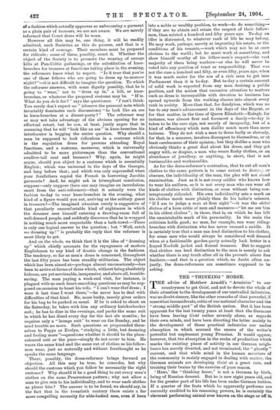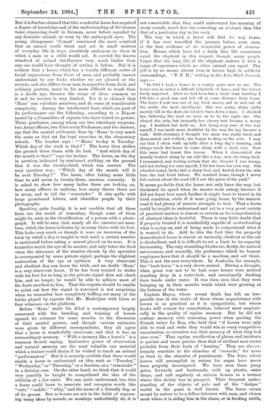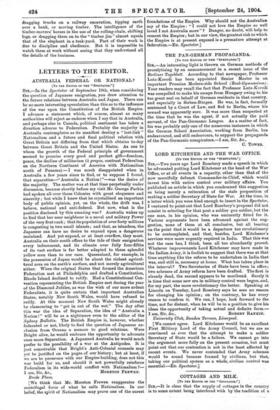'Hans,' the "thinking horse," is not a German by birth,
being of Russian descent. But he is now eight years old, and for the greater part of his life has been under German tuition. If a quarter of the feats which he apparently performs are correctly credited to his reasoning powers, he is certainly the cleverest performing animal ever known on the stage or off it. - But it is further claimed that this wonderful horse has acquired a degree of knowledge and of the understanding of the human voice, expressing itself in German, never before equalled by any domestic animal, or even by the anthropoid apes. The young chimpanzee 'Consul' convinced the most sceptical that an animal could think and act in small matters of everyday life in ways absolutely analogous to those in which a man or a child would act. It carried the known standard of animal intelligence very much higher than any one would-have thought of setting it before. But it is evident that a horse, which has a totally different series of facial expressions from those of man, and probably cannot understand by our looks whether we are pleased or the reverse, and also differs from man in regard to form, food, and ordinary posture, must be far more difficult to teach than is a docile ape, because the range of ideas common to it and its teacher is very limited. Yet it is claimed that 'Hans' can calculate numbers, and do MIMS of considerable complexity. Among the intellectual feats which are part of its performance are the following, according to a Report
• issued by a Committee of experts who have tested its powers. These gentlemen, among whom are two veterinary surgeons, two Army officers, two University Professors, and two doctors, say that the mental arithmetic done by 'Hans' is very much the same as that set for boys' exercises in the elementary schools. The teacher says : "'Hans,' to-day is Tuesday. Which -day of the week is that ?" The horse then strikes the ground three times with its foot. "And which day of - the month is that ? " says the trainer. The horse, on the day in question, indicated by continued striking on the ground that it was the twenty-third, which was correct. The next question was : "Which day of the month will it be next Tuesday ?" The horse, after taking some little time to add seven to twenty-three, answers correctly. It • is asked to show how many ladies there are looking on, how many officers in uniform, how many threes there are in seven, and to tell the "remainder." It also spells with large pasteboard letters, and identifies people by their photographs.
Speaking quite frankly, it is not credible that all these feats are the result of reasoning, though some of them might be, such as the identification of a person with a photo- graph. It will be seen that nearly all the answers are num- bers, which the horse indicates by so many blows with its foot. This looks very much as though it were an inversion of the trick by which a dog is taught to wait until a certain number is mentioned before eating a morsel placed on its nose. It is trained to watch the eye of its master, and only takes the food when the utterance of the number chosen by the spectator is accompanied by some private.signal, perhaps the slightest contraction of the eye or eyebrow. A very observant and obedient dog can learn the trick, and no doubt 'Hans' is a very observant horse. If he has been trained to strike with his foot for so long as the private signal does not check him, and no longer, he would be able to achieve most of the feats ascribed to him. That the experts should be unable to point out how the signal is conveyed is not surprising when we remember how completely baffling are many of the tricks played by experts like Mr. Maskelyne with three or four witnesses on the platform.
Before 'Hans' made his debut a contemporary largely concerned with the breeding and training of horses opened its columns for some months to the discussion of their mental powers, and though various estimates were given by different correspondents, they all agree that a horse is wonderfully observant, and that it has an extraordinary memory. "With a memory like a horse's" is a common Scotch saying. Instinctive power of observation and natural memory are the most valuable raw material which a trainer could desire if he wished to teach an animal "performances." But it is scarcely credible that these would enable a horse to understand an idea such as "Tuesday," "Wednesday," or" Thursday," or a fraction, or a " remainder " in a division sum. On the other band, we think that it could very possibly be taught to comprehend the idea of the addition of a few units. We can quite understand, too, that a horse could learn to associate and recognise words like "oats," "saddle," "whip," and the name of a friendly dog, or of its groom. But as horses are not in the habit of express- ing Many ideas by sounds, as monkeys undoubtedly 'do, it is not conceivable that they could understand the meaning of many sounds, much less one connoting an abstract idea like that of a particular day in the week.
The way in which a horse will find its way home, if it has ever travelled the journey before, even once, is the best evidence of its wonderful power of observa- tion. Horses which have led a fairly free life sometimes equal the elephant in this respect, though many people forget that the long life of the elephant endows it with a range of experience which no other animal can equal. The gift is by no means absent even in horses kept in artificial surroundings. "T. F. D.," writing in the Live Stock Journal, says :—
" In 1894 I took a bona+ in a county quite new to me. The house was in rather a difficult labyrinth of lanes, and the horses lately imported. After we had been but a short time hunting I fell into a good run and left off at some distance from home The horse I rode was one of my Irish mares, and in and out of the stable the most intelligent. She was going along quite merrily till in the dark she tried to turn down a lane. I checked her, believing the road we were on to be the right one. She obeyed the rein, but instantly her cheery trot became a weary jog. I doubted, but held on. Not being very sure of the way myself, I was made more doubtful by the way the jog became a walk. Still obstinate, I thought the mare was really tired, and dismounted and walked; she began to drag on the rein. I may say that I often walk up hills after a long day's hunting, and always teach the horse to come along with a slack rein. Now this mare had learnt this lesson. When I dismounted she usually trotted along by my side like a dog ; now she hung back. I remounted, and feeling certain that she thought I was wrong, and not feeling too sure myself, I let her have her own way. She wheeled round, broke into a sharp trot, and darted down the side lane she had tried before. We reached home, though I never felt certain about the road till I saw the gates of the yard."
It seems probable that the horse not only knew the way, but slackened its speed when its master went astray, because it did not know how much further it might have to travel in its tired condition, while if it were going home by the nearest road it had plenty of reserve strength to trot. That a horse could be taught to understand and act in a very great variety of practical matters is almost as certain as its comprehension of abstract ideas is doubtful. There is very little doubt that if properly treated it is wonderfully capable of understanding what is going on, and of being made to comprehend what it is Wanted to do. Add to this the fact that the properly domesticated horse is almost as naturally obedient as the cat is disobedient, and it is difficult to set a limit to its capacity for training. The only stumbling-blocks are, firstly, its natural nervousness, and secondly, the preference which its human employers have that it should be a machine, and not think. This is not the case everywhere. In Australia, for example, the "bush horse" is a very clever animal. During a drought, when grass was not to be had, some horses were noticed standing deep in a water-bole, and occasionally ducking their heads under water. It was then seen that they were bringing up in their mouths weeds which were growing at the bottom of the water.
Captain Hayes, whose recent death has left an irre- parable loss in the ranks of those whose acquaintance with horses is as practical as it is sympathetic, but whose books still remain for consultation, believed most emphati- cally in the quality of equine memory. But he did not confuse memory with reasoning power when quoting the French writer Le Bon, who held that "if horses were only able to read and write they would win in every competitive examination, so retentive was their memory of what they had once seen." That equine recollection of places and incidents is quicker and more precise than that of civilised man seems probable from their feats of "homing." They are also ex- tremely sensitive to the stimulus of "rewards," far more so than to the stimulus of punishment. The feats which horses will accomplish in return for sugar have never been properly investigated. We have seen them jump gates, forwards and backwards, walk up planks, enter shops, and call regularly at certain houses in a terrace where this dainty was in prospect.. Their frequent under- standing of the objects of polo and of the " dodges " useful in the game is well known. The horse seems meant by nature to be a fellow-labourer with man, and shines most Where it is aiding him in the chase, or in herding cattle, dragging trucks on a railway excavation, tipping earth over a bank, or moving timber. The intelligence of the timber-movers' horses in the use of the rolling-chain, shifting logs, or dragging them on to the "timber jim" almost equals that of the elephant in a teak-yard. Part of their work is due to discipline and obedience. But it is impossible to watch them at work without seeing that they understand all the details of the business.








































 Previous page
Previous page